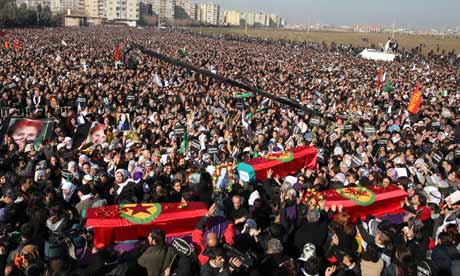in brief: murdered kurdish activists put fresh spotlight on conflict in turkey
 The bodies of three Kurdish women were laid to rest on 17 January in Diyarbakir, Turkey, six days after their brutal murders in Paris. The women were shot multiple times inside PKK (Partiya Karkerên Kurdistan, or the Kurdistan Workers Party) headquarters, reports the Independent. Sakine Cansiz, 52, Fidan Dogan, 32, and Leyla Soylemez, 25 were found eight hours after their killing, when police broke down the door to the Parisian apartment that served as the Kurdish Information Centre for the organisation.
The bodies of three Kurdish women were laid to rest on 17 January in Diyarbakir, Turkey, six days after their brutal murders in Paris. The women were shot multiple times inside PKK (Partiya Karkerên Kurdistan, or the Kurdistan Workers Party) headquarters, reports the Independent. Sakine Cansiz, 52, Fidan Dogan, 32, and Leyla Soylemez, 25 were found eight hours after their killing, when police broke down the door to the Parisian apartment that served as the Kurdish Information Centre for the organisation.
Police had been called to the apartment after Soylemez’s boyfriend couldn’t reach her on the night of the murders, reports the Independent. Blood stained the door of the building when the women were found, the morning of 10 January, still wearing their winter coats. There were no signs of a break-in.
At the time of writing, there are no suspects but plenty of speculation and the crimes have shaken police officials and citizens of both France and Turkey. The deaths are being treated as assassinations, and another spark in the ongoing conflict between the Turkish government and its Kurdish citizens, made up of roughly 20% of the population. The Turkish government, including Prime Minister Recep Tayyip Erdogan, has theorised that the murders were motivated by PKK infighting.
The PKK, formed in 1978, is considered a terrorist organisation by the European Union and the United States. It is a highly organised militant group, influenced by communist thinkers Lenin and Marx, and condemned for its attacks on Turkish citizens in its three-decade quest for greater Kurdish autonomy.
It also utilises more armed women than any other army contingent in the world. Not only are men and women expected to serve side-by-side, the party also always elects a man and a woman to serve as co-presidents. But, writes journalist Yesim Yaprak Yildiz for the BBC, that empowerment often comes at a steep price.
An estimated 40,000 people have died since the beginning of the Kurd/Turk conflict.
Cansiz was one of the PKK’s most prominent leaders and a founding member. While in prison in the 1980s, she led a Kurdish protest and following her release, was the head of a guerilla women’s movement in Iraq. Cansiz was in Paris leading the PKK’s European movement. Soylemez and Dogan were junior members – a diplomatic relations and women’s representative, and lobbyist, respectively.
Many Kurdish women have come to regard the movement as a means to greater opportunity. An emphasis on feminism and women’s rights drew thousands of women to the PKK in the 1990s. By the end of the decade, the separatist movement renounced violence and began working in universities throughout Europe. ‘Information centres’, like the one in which Cansiz, Soylemez, and Dogan were killed, serve to reach out to Kurdish population living on the continent. There are approximately 150,000 Kurds living in France.
The recent murders came at a time of attempted negotiation between the PKK and the Turkish government – talks that have now been derailed by the events in France.
Thousands of mourners attended their funerals in the city of Diyarbakir and Kurds have protested outside the information centre in Paris.


Pingback: Feminist News Round-up 27.01.13 | News | Lip Magazine